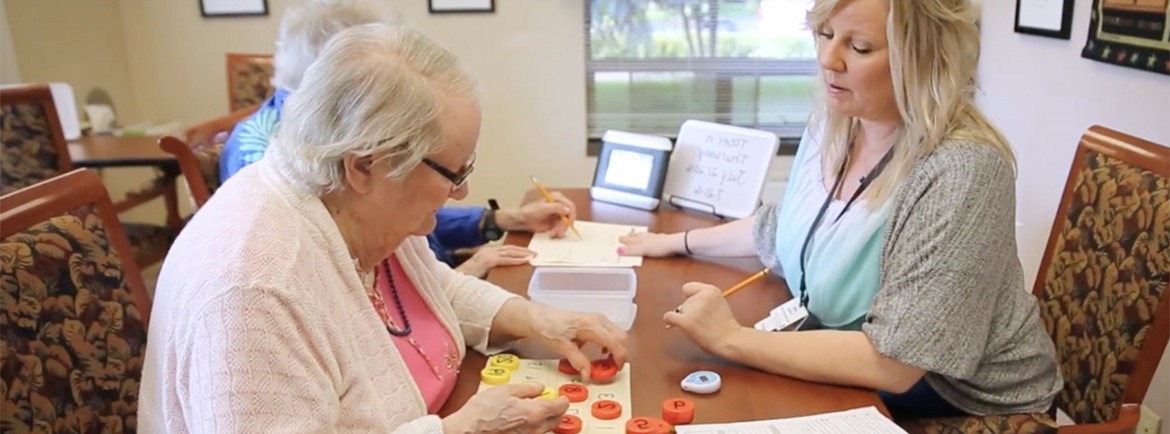Explore SAIDO Learning
Improving the quality of life for seniors with Alzheimer’s and dementia.
Alzheimer’s disease and dementia constitute the 6th leading cause of death in the United States today, with an estimated 6 million older adults diagnosed. Every 65 seconds someone in the United States is diagnosed with Alzheimer’s or another form of dementia with more than 5.8 million currently living with it (Alzheimer’s Association). A proven and successful approach to memory care is the SAIDO® Learning Program, offered exclusively at Covenant Living.
SAIDO Learning was developed by the Kumon Institute of Education in Osaka, Japan and is a nonpharmacological program based on a learning intervention. It offers mental exercises and an opportunity for enhancing individual engagement with staff and others in everyday life. The goal of SAIDO Learning is to not only provide care for individuals with dementia, but to improve their quality of life through intentional engagement opportunities. SAIDO does not just treat the symptoms of dementia, SAIDO changes the whole person, which is why Covenant Learning believes in our partnership.
Benefits of SAIDO
Visit a SAIDO community and you’ll quickly see how SAIDO is enlivening residents. Some of the benefits of the program include:
- Social interactions reducing the isolation felt by so many individuals in a memory care setting.
- People engaged in SAIDO Learning programs are encouraged to participate more fully in activities of daily living.
- SAIDO offers a truly personalized resident experience, enriches connections with family and loved ones, and enhances professional development for staff.
How SAIDO Learning Works
The SAIDO Learning method involves a caregiver (called a “Supporter”) trained to work with two older adults (called “Learners”) by engaging them in a series of precise, yet simple, arithmetic, writing and reading exercises. The exercises are performed five times per week and last 30 minutes. The object of the program is not to teach the material but to engage the Learner in the accomplishment of repeated successful exercises, progressing to new material at the Learner’s own level and pace. This process fosters the Learner’s confidence, abilities, and initiative to advance and try new things. Changes in Learners are often observed and range from being more engaged in daily activities and meals, more socially involved with caregivers and families, and more optimistic about daily living. Learners have also shown increased engagement and social interaction with others.
To learn more or partner with us click here.




Working at Covenant Living is more than just a job—it’s a passion shared by our staff, and giving back is at the heart of what we do.
Here’s what an employee at Covenant Living of the Great Lakes has to say about why he donates:
“Every day at work, I hear incredible stories from our residents about the amazing things they’ve accomplished throughout their lives. It’s inspiring to learn about all the extraordinary experiences they’ve had. These stories remind me just how important it is for our residents to feel comfortable and worry-free as they enjoy their twilight years. That’s why I believe it’s essential to ensure they never have to worry about whether they can afford to stay here, whether it’s 5, 10, or even 20 years down the road. They’re all like grandparents to me—I can’t imagine any of them having to leave because of financial concerns outside of their control.”
Join us in showing your appreciation and sharing your “Why” by visiting us at bit.ly/3VcDdUf. ... See MoreSee Less
Comment on Facebook
On March 19th, Covenant Living at the Holmstad had the joy of celebrating our incredible team at the Long-Term Service Awards Banquet. It was an evening to honor those who’ve been part of Covenant Living for five years or more — some for a decade or two, and a few who’ve been with us for over forty years. That’s not just time—it’s a legacy of care, compassion, and community.
These team members have built careers rooted in purpose, growing alongside our residents and making The Holmstad the warm, welcoming place it is today. We’re so grateful for all they’ve given, and we look forward to many more celebrations ahead.
#CovenantLiving #TheHolmstad #TeamAppreciation #Gratitude #SeniorLivingCommunity ... See MoreSee Less
Comment on Facebook
Happy April Fools’ Day! 🎉
We’re keeping it lighthearted today… but don’t worry, there’s no pranking happening here – just a lot of Spring cheer!
Just a friendly reminder: Laughter is good for the soul, so let’s share a smile and a joke with those around us today. After all, we all could use a little extra joy in our lives!
#AprilFools #LaughterIsTheBestMedicine ... See MoreSee Less
Comment on Facebook